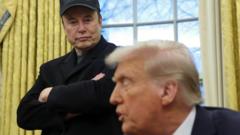During his unexpected first appearance at the White House, Elon Musk, flanked by President Trump, staunchly rejected accusations of a "hostile takeover" of the US government while defending his agency's aggressive cost-cutting strategies aimed at reducing the federal workforce. Critics, particularly from the Democratic side, have raised alarms about transparency and potential conflicts of interest.
Musk Defends Cost-Cutting Plans Amid Claims of Government Takeover

Musk Defends Cost-Cutting Plans Amid Claims of Government Takeover
In a controversial Oval Office appearance, Elon Musk addresses reporters about his role in reducing federal spending and brushes off allegations of conducting a "hostile takeover" of the government.
Elon Musk made headlines with a surprising appearance at the White House on Tuesday, where he adamantly denied leading a "hostile takeover" of the U.S. government as he fielded questions from reporters in the Oval Office alongside President Donald Trump. The billionaire entrepreneur has been appointed to gauge and drive down the size and expenditure of federal operations through his newly established Department of Government Efficiency (Doge).
During his first press conference since Trump assumed office, Musk related his cost-cutting initiatives to what he deemed common sense, asserting their necessity for government reform. "The people voted for major government reform and that's what the people are going to get," he stated, emphasizing the importance of reducing federal spending to ensure the fiscal health of the country.
Following Musk's remarks, Trump signed an order granting Doge significant authority to execute cuts across federal agencies. Heads of government departments were directed to align with the agency's plans, a move that has drawn criticism from Democrats citing concerns surrounding transparency and effectiveness.
In a somewhat jovial tone, Musk also described federal workers as an "unelected, fourth, unconstitutional branch of government," suggesting that they wield more influence than elected officials. He noted that it was essential for the U.S. to reduce federal expenses in order to maintain its solvency.
Musk’s recent statements about government spending have not been free from controversy. Responding to a debunked claim regarding the U.S. government providing condoms to Gaza, Musk acknowledged that his comments might sometimes be inaccurate.
Amid rising pushback from Democrats, who accuse Musk of managing an "unelected shadow government," Trump defended the crusade for cost reductions, which allegedly targets a staggering $1 trillion in wasteful spending. The president’s confidence in Musk’s oversight efforts has put the administration on a collision course with essential judicial reviews regarding executive powers and departmental efficiency.
Musk’s ambitious agenda has met obstacles, including legal challenges that could hinder the depth and speed of federal workforce reductions. With Republicans dominating both chambers of Congress, the Trump administration's quest to reshape government spending remains fraught with complexity.
As rising tensions over budget cuts unfold, a recent CBS News poll suggests that while many Americans support Musk's goals, questions linger on the extent of his influence over government affairs.





















